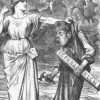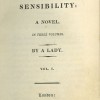
Kristi N. Embry, “The Entente cordiale between England and France, 8 April 1904″
The Entente cordiale was a series of formal political agreements signed in 1904 that negotiated the peace between England and France. French for “warm understanding,” the Entente cordiale of 1904 settled more immediate disputes between England and France in Egypt, Morocco, and elsewhere in Africa. Perhaps more famously, the series of agreements signed in 1904 contributed to the harmonization of relations between the two countries in the twentieth and twenty-first centuries. But, as I show here, the Entente cordiale of 1904 also served as the culmination of a more informal—and precarious—entente that had slowly developed between the former enemies beginning in the 1830s and 1840s.

Alexander J. Dick, “On the Financial Crisis, 1825-26”
The crash of 1825-1826 was the first modern financial crisis. Unlike earlier speculative bubbles, the 1825 crisis was not caused only by exogenous circumstances like war or overzealous investment. The real cause of the 1825 crisis was the diversification of the finance economy into tiny investment units—a loan here, an insurance policy there—offered as seemingly responsible ways to maintain credit and generate capital. When the market finally did crash, no single group or class could be blamed for causing it. Economists came to realize that the market was always at the mercy of booms and busts and that no single individuals or professions within it could be said to be in charge of it. In other words, 1825 marks the moment at which capitalism grew from an ideological enterprise into a global condition. 1825 also marks a crucial transition in the publishing industry, the point at which the traditional market for vellum-bound epics and triple-decker novels was eclipsed by cheap reprints and serial publications. It thus signals the end of what we might call the Romantic ideal and the emergence of an existential malaise in English literature that persists in Victorian writing and beyond.

Elaine Hadley, “On Opinion Politics and the Ballot Act of 1872”
This article argues that opinion politics is one of the most significant developments in the nineteenth century, and does so by focusing in part on the Ballot Act of 1872. It provides a quick overview of the scene of elections prior to the reforms of 1832 and 1867 in order to highlight the emergence of the opinionated, purposive individual as the agent and medium of politics. it describes the mid-century variant of this political individual, the focus at this moment on the cognitive procedures of opinion formation, and the stresses this commitment produced in the political domain. It also briefly describes the late-century changes in opinion politics, and notes its continued salience in present-day politics.

Kelly Hager, “Chipping Away at Coverture: The Matrimonial Causes Act of 1857”
The Matrimonial Causes Act of 1857 made divorce legal under British law and was the first law to protect a wife’s property. It was thus the second piece of legislation (after the 1839 Custody of Infants Act) to require Parliament to examine the ramifications of the common law doctrine of coverture; the passage of these two acts began to chip away at that cruel precedent. While the bill originally introduced in 1854 was procedural in nature—designed to remedy the anomaly of a legal system that granted divorces by Private Act of Parliament though divorce was, strictly speaking, illegal—by the time it became law, three years later, the public debate over the rights of married women had become so heated that the final version of the bill not only put divorce on the books and made it straightforwardly and absolutely legal, but also provided for the protection of divorced, separated, and deserted wives.

Jill Rappoport, “Wives and Sons: Coverture, Primogeniture, and Married Women’s Property”
Prior to political agitation for the reform of married women’s property laws, nineteenth-century fiction emphasized primogeniture (the common law doctrine of consolidating wealth in the hands of eldest sons) alongside coverture (the common law doctrine that marriage voided a wife’s separate legal identity) in order to show how both contributed to women’s economic marginalization. The reform movement, however, focused its attention on coverture, and by the time of the 1870 Act, fiction begins to divorce its sympathy for women’s subjugation in coverture from its treatment of women’s condition with respect to primogeniture. This case study of novels by Jane Austen and George Eliot suggests that, as coverture comes under closer scrutiny, primogeniture is no longer showcased as one of women’s most significant economic disadvantages. Instead, the claims of primogeniture begin to appear as an argument against women’s rights to property.

Pamela K. Gilbert, “On Cholera in Nineteenth-Century England”
This essay will focus on how the British understood and responded to the cholera epidemics that swept Britain four times from the early eighteen-thirties to the mid-eighteen-sixties, with special attention to the first epidemic and how it related to political Reform.

Christopher Lane, “On the Victorian Afterlife of the 1781 Sunday Observance Act”
Proposed in 1780 to “suppress” the rise of Dissenting and freethinking societies, the Sunday Observance Act was passed in 1781 and adopted across Britain that year. In seeking to encourage Sunday worship, the new law aimed to curb Sunday trading and to prevent the public on such days from visiting parks, museums, zoos, theaters, meeting-houses, and concert halls. The interest of this essay lies in the cultural effects of such legislation, as well as in the figure who proposed it, Bishop Beilby Porteus, and the freethinking philosopher, William Nicholson, who is said to have challenged Porteus and Britain’s episcopacy by detailing the law’s and the Bible’s inconsistencies. The pamphlet attributed to Nicholson, though its authorship remains contested, is called The Doubts of Infidels.

Elsie B. Michie, “On the Sacramental Test Act, the Catholic Relief Act, the Slavery Abolition Act, and the Factory Act”
Examining two sets of intertwined Parliamentary Acts that went into effect before and after the Reform Act of 1832, this entry argues that they make visible the gestures that led up to and resulted from reform.

Ivan Kreilkamp, “The Ass Got a Verdict: Martin’s Act and the Founding of the Society for the Prevention of Cruelty to Animals, 1822”
This article presents the history and pre-history of Martin’s Act (1822), “Act to prevent the cruel and improper treatment of Cattle,” and the subsequent founding, in 1824, of the Society for the Prevention of Cruelty to Animals (after 1840, the Royal Society for the Prevention of Cruelty to Animals). It explains and analyzes the late-eighteenth-century and early-nineteenth-century context in which the animal welfare or anti-cruelty movement emerged. It also discusses the failed 1809 Act proposed by Lord Erskine and Richard Martin’s successful 1822 Act, and analyzes the particular role played by ridicule and shifting boundaries of humor in the discourse surrounding human treatment of animals.

Rachel Ablow, “‘One Flesh,’ One Person, and the 1870 Married Women’s Property Act”
The 1870 Married Women’s Property Act marked a shift in the way marriage was regarded in England. Before that point, debates relating to divorce, married women’s property, and child custody revolved around different ideas of what constituted the good marriage: while many conservatives claimed that coverture (the legal doctrine that absorbed a married woman’s legal identity into her husband’s) guaranteed sympathetic communion between spouses, many progressives claimed that only legal equality could enable husbands and wives to enter fully into one another’s feelings. The 1870 Act marked a shift away from conservatives’ claims and towards those of progressives.
